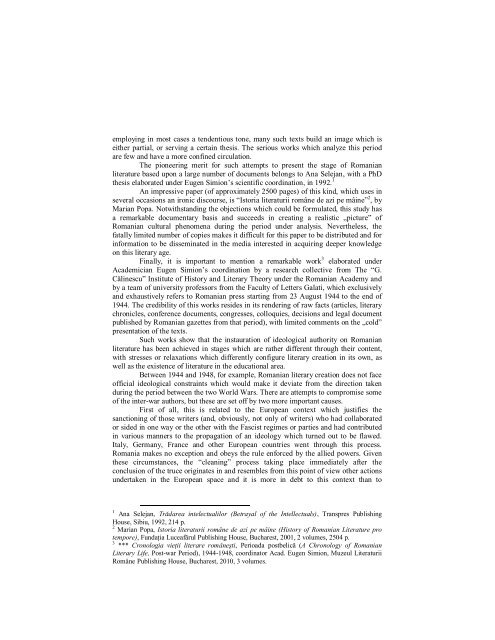language and literature european landmarks of identity
language and literature european landmarks of identity
language and literature european landmarks of identity
You also want an ePaper? Increase the reach of your titles
YUMPU automatically turns print PDFs into web optimized ePapers that Google loves.
employing in most cases a tendentious tone, many such texts build an image which is<br />
either partial, or serving a certain thesis. The serious works which analyze this period<br />
are few <strong>and</strong> have a more confined circulation.<br />
The pioneering merit for such attempts to present the stage <strong>of</strong> Romanian<br />
<strong>literature</strong> based upon a large number <strong>of</strong> documents belongs to Ana Selejan, with a PhD<br />
thesis elaborated under Eugen Simion’s scientific coordination, in 1992. 1<br />
An impressive paper (<strong>of</strong> approximately 2500 pages) <strong>of</strong> this kind, which uses in<br />
several occasions an ironic discourse, is “Istoria literaturii române de azi pe mâine” 2 , by<br />
Marian Popa. Notwithst<strong>and</strong>ing the objections which could be formulated, this study has<br />
a remarkable documentary basis <strong>and</strong> succeeds in creating a realistic „picture” <strong>of</strong><br />
Romanian cultural phenomena during the period under analysis. Nevertheless, the<br />
fatally limited number <strong>of</strong> copies makes it difficult for this paper to be distributed <strong>and</strong> for<br />
information to be disseminated in the media interested in acquiring deeper knowledge<br />
on this literary age.<br />
Finally, it is important to mention a remarkable work 3 elaborated under<br />
Academician Eugen Simion’s coordination by a research collective from The “G.<br />
Călinescu” Institute <strong>of</strong> History <strong>and</strong> Literary Theory under the Romanian Academy <strong>and</strong><br />
by a team <strong>of</strong> university pr<strong>of</strong>essors from the Faculty <strong>of</strong> Letters Galati, which exclusively<br />
<strong>and</strong> exhaustively refers to Romanian press starting from 23 August 1944 to the end <strong>of</strong><br />
1944. The credibility <strong>of</strong> this works resides in its rendering <strong>of</strong> raw facts (articles, literary<br />
chronicles, conference documents, congresses, colloquies, decisions <strong>and</strong> legal document<br />
published by Romanian gazettes from that period), with limited comments on the „cold”<br />
presentation <strong>of</strong> the texts.<br />
Such works show that the instauration <strong>of</strong> ideological authority on Romanian<br />
<strong>literature</strong> has been achieved in stages which are rather different through their content,<br />
with stresses or relaxations which differently configure literary creation in its own, as<br />
well as the existence <strong>of</strong> <strong>literature</strong> in the educational area.<br />
Between 1944 <strong>and</strong> 1948, for example, Romanian literary creation does not face<br />
<strong>of</strong>ficial ideological constraints which would make it deviate from the direction taken<br />
during the period between the two World Wars. There are attempts to compromise some<br />
<strong>of</strong> the inter-war authors, but these are set <strong>of</strong>f by two more important causes.<br />
First <strong>of</strong> all, this is related to the European context which justifies the<br />
sanctioning <strong>of</strong> those writers (<strong>and</strong>, obviously, not only <strong>of</strong> writers) who had collaborated<br />
or sided in one way or the other with the Fascist regimes or parties <strong>and</strong> had contributed<br />
in various manners to the propagation <strong>of</strong> an ideology which turned out to be flawed.<br />
Italy, Germany, France <strong>and</strong> other European countries went through this process.<br />
Romania makes no exception <strong>and</strong> obeys the rule enforced by the allied powers. Given<br />
these circumstances, the “cleaning” process taking place immediately after the<br />
conclusion <strong>of</strong> the truce originates in <strong>and</strong> resembles from this point <strong>of</strong> view other actions<br />
undertaken in the European space <strong>and</strong> it is more in debt to this context than to<br />
1<br />
Ana Selejan, Trădarea intelectualilor (Betrayal <strong>of</strong> the Intellectuals), Transpres Publishing<br />
House, Sibiu, 1992, 214 p.<br />
2<br />
Marian Popa, Istoria literaturii române de azi pe mâine (History <strong>of</strong> Romanian Literature pro<br />
tempore), Fundaţia Luceafărul Publishing House, Bucharest, 2001, 2 volumes, 2504 p.<br />
3<br />
*** Cronologia vieţii literare româneşti, Perioada postbelică (A Chronology <strong>of</strong> Romanian<br />
Literary Life, Post-war Period), 1944-1948, coordinator Acad. Eugen Simion, Muzeul Literaturii<br />
Române Publishing House, Bucharest, 2010, 3 volumes.


